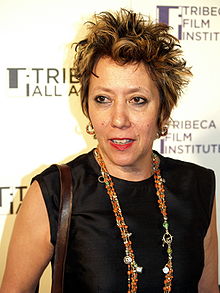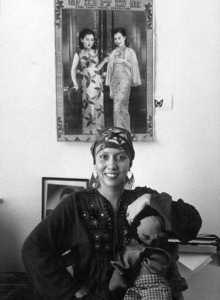Jessica Hagedorn
This article includes a list of general references, but it remains largely unverified because it lacks sufficient corresponding inline citations. (June 2010) |
Jessica Tarahata Hagedorn | |
|---|---|
 Hagedorn at the Tribeca Film Festival in 2008 | |
| Born | 1949 Manila, Philippines |
| Nationality | United States |
| Occupation |
|
Jessica Tarahata Hagedorn (born 1949) is an American playwright, writer, poet, and multimedia performance artist.
Biography[]
Hagedorn is an American of mixed descent. She was born in Manila to a Scots-Irish-French-Filipino mother and a Spanish Filipino father with one Chinese ancestor.[1] Moving to San Francisco in 1963, Hagedorn received her education at the American Conservatory Theater training program. To further pursue playwriting and music, she moved to New York City in 1978.
Joseph Papp produced her first play Mango Tango in 1978. Hagedorn's other productions include Tenement Lover, Holy Food, and Teenytown. Her mixed media style often incorporates song, poetry, images, and spoken dialogue. From 1975 until 1985, she was the leader of a poet's band -- The West Coast Gangster Choir (in SF) and later The Gangster Choir (in New York).
In 1985, 1986, and 1988, she received MacDowell Colony fellowships, which helped enable her to write the novel Dogeaters, which illuminates many different aspects of Filipino experience, focusing on the influence of America through radio, television, and movie theaters. She shows the complexities of the love-hate relationship many Filipinos in diaspora feel toward their past. After its publication in 1990, her novel earned a 1990 National Book Award nomination and an American Book Award. In 1998 La Jolla Playhouse produced a stage adaptation.[2] In 2001, the play adaptation premiered off-Broadway at The Public Theater.
Hagedorn worked with playwrights and artists Robbie McCauley and Laurie Carlos as the collective Thought Music, which later expanded to include visual artist John Woo as well. Together Thought Music created a number of works including Teenytown (presented at La Mama in 1987)[3] and class (presented at The Kitchen in 2000).[4] Thought Music together investigated race, class, sexism, and the role of immigrants in the United States.[5] Hagedorn, with Thought Music and on her own, has also collaborated with Urban Bush Women on works including Heat[6] and Lipstick.[7]
Hagedorn lives in New York City with her daughters.
Literary works[]

- Chiquita Banana. Third World Women (3rd World Communications, 1972)
- Pet Food & Tropical Apparitions (Momo's Press, 1975)
- Dangerous Music (Momo's Press, 1975)
- Mango Tango (Y'Bird Magazine January 1, 1977)
- Dogeaters (Penguin Books, 1990)
- Danger and Beauty (Penguin Books, 1993)
- Charlie Chan is Dead: An Anthology of Contemporary Asian American Fiction (editor) (Penguin Books, 1993)
- The Gangster of Love (Houghton Mifflin, 1996)
- Burning Heart: A Portrait of the Philippines (with Marissa Roth) (Rizzoli, 1999)
- Dream Jungle (Viking Press/Penguin), 2003)
- Toxicology (Penguin Books, 2011)
Anthologies that include Hagedorn's work[]
- Four Young Women, ed. Kenneth Rexroth (New York: McGraw-Hill, 1973).
- Time To Greez! Incantations From the Third World, eds. Janice Mirikitani, et al. (San Francisco: Glide Pubs., 1975).
- American Born and Foreign: An Anthology of Asian American Poetry, eds. Fay Chiang, et al. (New York: Sunbury Press Books, 1979).
- Breaking Silence: An Anthology of Contemporary Asian American Poets, ed. Joseph Bruchac (New York: Greenfield Review Press, 1983).
- The Open Boat: Poems From Asian America, ed. Garrett Hongo (New York: Doubleday, 1993).
- Stars Don't Stand Still in the Sky: Music and Myth, eds. Karen Kelly and Evelyn McDonnell (New York: New York University Press, 1999).
- Stage Presence: Conversations with Filipino American Performing Artists, ed. Theodore S. Gonzalves (San Francisco and St. Helena: Meritage Press, 2007).
- The Soho Press Book of 80s Short Fiction, ed. Dale Peck (New York, NY: Soho Press, 2016).
References[]
- ^ Nakao, Annie (November 2, 2003). "Hagedorn's reel life dreams / A San Francisco-raised author's apocalyptic roman a clef". San Francisco Chronicle. Retrieved August 29, 2013.
- ^ "ABOUT | JESSICA HAGEDORN". www.jessicahagedorn.net. Retrieved 2018-03-03.
- ^ "Teenytown | Robbie McCauley". robbiemccauleyncompany.com. Retrieved 2018-03-03.
- ^ "class | The Kitchen Archive". archive.thekitchen.org. Retrieved 2018-03-03.
- ^ Carr, C. (2012-04-09). On Edge: Performance at the End of the Twentieth Century. Wesleyan University Press. ISBN 9780819572424.
- ^ "Heat | The Kitchen Archive". archive.thekitchen.org. Retrieved 2018-03-03.
- ^ "Jacobs Pillow Archive: Moving image: Urban Bush Women [295]". archives.jacobspillow.org. Retrieved 2018-03-03.
Sources[]
- Seiwoong Oh: Encyclopedia of Asian-American Literature. Series: Encyclopedia of American Ethnic Literature. Facts on File, 2007
External links[]
| Wikiquote has quotations related to: Jessica Hagedorn |
- Manila Noir
- Guide to the Jessica Tarahata Hagedorn Papers at The Bancroft Library
- Finding aid for the Roberta Uno Asian American Women Playwrights Scripts Collection, 1924–2002, featuring Mango Tango (1978), Where the Mississippi Meets the Amazon (with Ntozake Shange and Thulani Davis) (1978), Holy Food (1988), and Airport Music (with Han Ong (1993) at the Special Collections and University Archives, W.E.B. Du Bois Library, University of Massachusetts Amherst
- Modern American Poetry
- Jessica Hagedorn & The Gangster Choir - Tenement Lover (MP3 file) from the LP "A Diamond Hidden In The Mouth Of A Corpse" (1985) hosted on UbuWeb.
- 1949 births
- Living people
- 20th-century American novelists
- 21st-century American novelists
- American women novelists
- American women poets
- American writers of Filipino descent
- Filipino emigrants to the United States
- Filipino novelists
- Filipino people of Chinese descent
- Filipino people of French descent
- Filipino people of Irish descent
- Filipino people of Spanish descent
- Filipino women writers
- Writers from Manila
- Postmodern writers
- American women dramatists and playwrights
- Writers from New York City
- 20th-century American women writers
- 21st-century American women writers
- 20th-century American poets
- 20th-century American dramatists and playwrights
- 21st-century American poets
- American Book Award winners
- Novelists from New York (state)